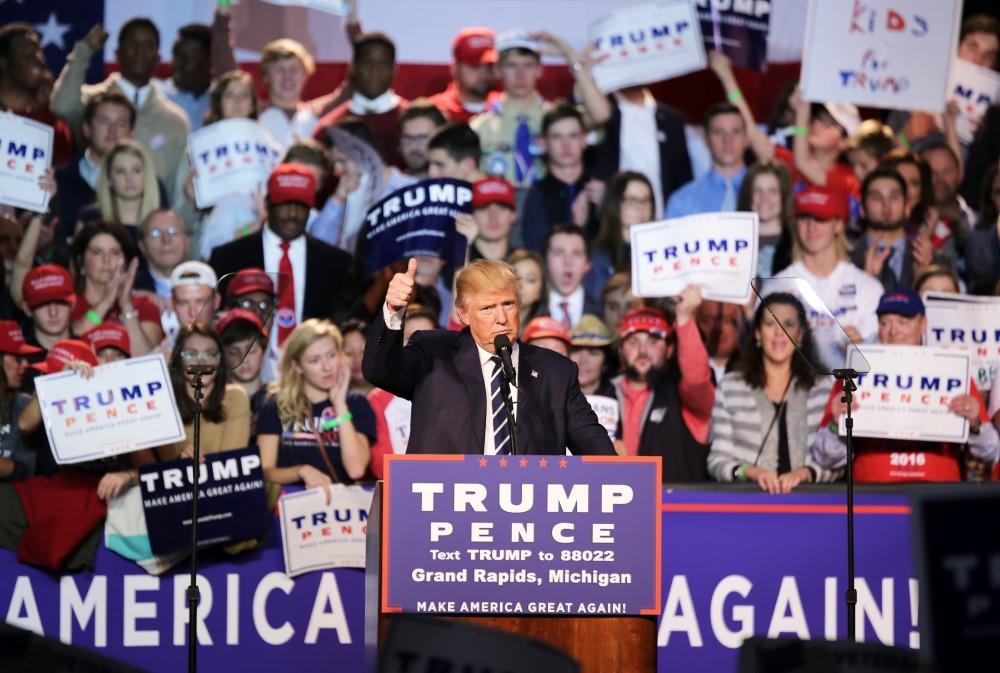Trump’s ‘shithole’ comments cause stir

GVL Archives
Jan 15, 2018
As has been the case since his election in November 2016, President Donald Trump continued to be in the news over reported inflammatory comments.
On Friday, Jan. 12, The Washington Post reported that Trump, during a White House meeting with lawmakers focused on creating bipartisan immigration legislation, referred to El Salvador, Haiti and African countries as “shitholes.”
“Why are we having all these people from shithole countries come here?” Trump said, according to people with knowledge of the meeting. Trump reportedly derided Haiti later on as well, saying, “Why do we need more Haitians? Take them out.”
Trump’s comments resonated across social media sites, including Twitter, soon after The Post released the story. Several legislators and political figures, including those associated with the state of Michigan, offered their responses on Twitter and through other releases.
Rob Davidson, a Democratic congressional candidate vying for U.S. Rep. Bill Huizenga’s (R-Zeeland) seat in 2018, called for his opponent to denounce Trump over the comment.
“West Michigan is a diverse, dynamic community whose growth is the work of many people coming together for the common good, including people from countries President Trump described in language we wouldn’t allow our kids to use,” Davidson wrote in a press release. “Congressman Bill Huizenga has a duty as a community leader and as a Christian to uphold lessons from the Bible that tell us to feed, clothe, and open our door to immigrants for we were immigrants in Egypt once. As our representative, Congressman Huizenga must show that he stands with our diverse and tolerant community by denouncing Donald Trump’s racist slur and demanding the president apologize to all Americans for his ignorant, hateful rhetoric. Silence equals agreement.”
Huizenga tweeted on Thursday that he “whole heartedly” agreed with U.S. Rep. Mia Love (R-Utah) after she tweeted her contempt for Trump’s comments. He has yet to publicly respond to Davidson.
Michigan gubernatorial candidates either denounced the comments or stayed silent. Democratic dark-horse candidate Dr. Abdul El-Sayed tweeted, “… what a national embarrassment (Trump) is.” Green Party candidate Jennifer Kurland wrote in a press release that Trump’s comments were “thinly veiled racist rhetoric.”
The two current front-runners for the Republican and Democratic nominees didn’t offer comment, however. Michigan Attorney General and Republican candidate Bill Schuette and former Michigan Minority Leader and Democratic candidate Gretchen Whitmer both stayed silent on the issue. According to a December 2017 poll conducted by EPIC-MRA of Lansing, Schuette had a 3-percentage-point lead on Whitmer. The margin of error for the poll was 4 points.
While the White House did not deny that the comments were made, Trump tweeted on Thursday that he “never said anything derogatory about Haitians other than Haiti is, obviously, a very poor and troubled country. Never said ‘take them out.’ Made up by Dems. I have a wonderful relationship with Haitians. Probably should record future meetings – unfortunately, no trust!”
“Certain Washington politicians choose to fight for foreign countries, but President Trump will always fight for the American people,” said White House spokesperson Raj Shah in a release.
In addition to the alleged comments on Haiti, El Salvador and African countries, Trump also reportedly added that he believes that the U.S. should look to add more immigrants from Norway, a country whose prime minister met with Trump the day before. According to the eyewitnesses, Trump said he was open to immigrants from Asian countries, believing that they could help the U.S. economically.
The bulk of Trump’s campaign was built around his hard stance toward immigration, as well as a proposed border wall between the U.S. and Mexico. In November 2017, the Trump administration ended protection for 60,000 Haitian immigrants living in the U.S. after the 2010 Haitian earthquake. On Monday, Jan. 8, the administration announced a plan that removes protections for 200,000 Salvadorans. As of January 2018, no significant legislation toward creating a border wall has been passed.






















